New research reveals potential for stem cells to treat low testosterone, offering hope for a more natural restoration of hormone levels
A groundbreaking study has opened up the possibility of using stem cell therapy as a means to boost testosterone levels in men, potentially offering an innovative alternative to traditional testosterone replacement therapy (TRT). The research, focusing on the use of multipotent mesenchymal stromal cells (MMSCs) derived from umbilical cord blood, indicates significant promise in restoring endogenous testosterone production, thus providing a more natural approach to managing low testosterone levels.
The study, which involved 60 men diagnosed with non-obstructive azoospermia (NOA), explored the effects of MMSC therapy administered both intravenously and directly into the testicles. Over the course of three months, the participants showed an increase in average total testosterone levels from the hypogonadal range of approximately 251 ng/dl to a normal range of around 355 ng/dl. Additionally, levels of luteinizing hormone (LH) saw an increase, whereas follicle-stimulating hormone (FSH) levels unexpectedly declined.
Embed from Getty ImagesWhile the exact mechanisms behind the testosterone increase remain under investigation, the rise is presumed to be partially due to the differentiation of newly formed Leydig cells. It’s worth noting that despite the overall positive trend, a significant portion of the participants did not achieve testosterone levels outside the hypogonadal range, signalling the need for further research to fully understand the efficacy and potential of stem cell therapy in this context.
This pioneering study not only paves the way for a potentially more effective and natural treatment option for men suffering from low testosterone but also raises intriguing questions about the use of stem cell therapy in sports doping, given the challenges in detection.
As the medical community continues to explore the vast potential of stem cell therapy, these initial findings offer a glimpse into a future where conditions like low testosterone could be treated without the need for exogenous hormone administration, thereby minimizing potential disadvantages and promoting a holistic approach to hormone health.
